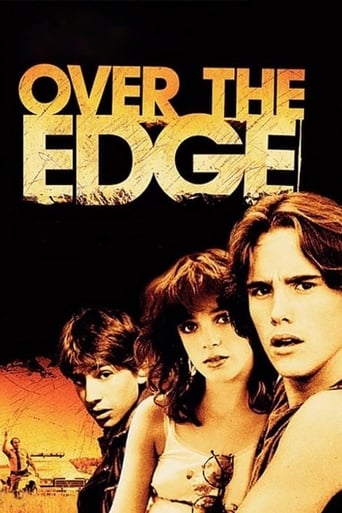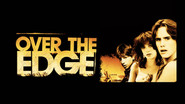dworldeater
Over The Edge is a classic film about teen angst that is very powerful, well done and authentic. While my junior high years were a decade later, these are the type of kids that I could hang with and relate to. This is pretty on point and truthful perspectives to the crowd that uptight adults refer to as "juvenile delinquents". The kids in this film aren't given much to do in the placid, condominium community of New Grenada. So when they are pushed to the boiling point, they push back hard and truly raise hell in this great film. This is taken from the point of view of the disenfranchised youth and the adult and authoritative figures are treated accordingly. This is all to the kick ass 70's sound track that includes Cheap Trick, Van Halen, The Cars and The Ramones. This is also the film debut of actor Matt Dillon, who gives a powerful performance as rebel youth Richie. Over The Edge is my kind of movie and reminds me of a lot of my own experiences as a bored and frustrated teenager living in the suburbs.
bandw
The story takes place in a "planned community" in the 1970s. In planning this community there was little consideration that there would be a large teenage population there. The kids had only a Quonset hut as a center to hang out in and it was a pretty drab place. It did have a pool table, a foosball table, a basketball hoop, and a sound system, so it was not a total loss. But there were no movie theaters, no bowling alleys, no malls, no parks, etc. Given the rather bleak lack of diverting opportunities many young teenagers turned to drugs and vandalism for entertainment. Considering the homogeneity of the split-level housing styles, lack of trees, uniform lot sizes, and overall lack of any poetry, it is not clear how the adults had many more diversions than the kids, but instead of turning to drugs and vandalism they concentrated on making money.There are good things to be had here. The original appearance of fourteen-year-old Matt Dillon is one of them. In playing alpha male Ritchie White he is so natural in the part that you have to believe that he wasn't acting, but only being himself. As Ritchie's sidekick Carl I found Michael Kramer's portrayal created much sympathy. Carl was not the native badass that Ritchie was, but was easily drawn in to Ritchie's sphere of influence. All of the young kids in the movie were actual young teens and, while the acting skills were not the highest, they gave the movie an authenticity that would have been hard to accomplish with experienced older actors.The soundtrack using 1970s rock music is a definite plus and is perfect accompaniment. One of the refuges the kids had was in listening to music; in that sense times have not changed. One gets so accustomed to current technologies that it was a bit of a jolt to see the kids using turntables in their sound systems. This movie was filmed in 1978, just about the time that the first Walkman came out and long before CDs or iPods.I was left with conflicting reactions to the story and I guess that that is ultimately in its favor since so many movies make little impression. I thought the story was told in a manner to make me sympathize with the kids, but then it was hard to condone much of their behavior, such as shooting BB guns at cars passing under an overpass, or stealing a gun. The drug usage is not too hard to accept in any generation coming after the 1960s and, even though the impression is that the kids are constantly high, what is actually shown is pretty minimal. I can't remember seeing Ritchie partake in anything more than a bottle of beer; Carl is seen taking a single toke on a joint and nothing more; and one kid has taken LSD before a school test. And there is no sexual coupling to be seen.I felt that most of the adult behavior was exaggerated to make them seem like the enemy. Carl's dad is more interested in his Cadillac dealership than in his son. The emphasis in the adult world is on growth. The local law often exceeds its authority, like conducting searches for no probable cause. But the police were probably fed up with dealing with these kids. Carl's and Richie's mothers seemed approachable--it was too bad that some honest communication could not have been established between them, but I suppose that is asking too much from young teens. It is made out that the whole school was on the same emotional plane as the lead characters--surely there were some studious sorts or sports nuts among the teens.The ending is most unfortunate, missing an opportunity to delve a little deeper in trying to understand the conflicts rather than giving the audience over the top explosions and improbable scenes. In one instance a single rifle shot at a parked car causes it to explode as if it were hit by a grenade. The conflagration that engulfed the teen center appeared to have the force of an atomic bomb. I kept wishing that these kids could have been a little more resourceful in finding better ways to entertain themselves. Apparently in the real event that formed the basis for this movie the climax had the kids showing up at the meeting of the parents at the school and presenting their grievances. How much more interesting that would have been than what is shown. The final scenes of mayhem and destruction changed my feelings of sympathy for the kids to feelings of despair that there would ever be a civil resolution to their inter-generational conflicts.I would think that, with the advent of all the electronic entertainment devices and the existence of internet porn, that juvenile crime would be down in recent years, but anti-social behavior seems to be encoded into the DNA of most young males.Maybe in response to movies like this it is now common that, rather than being ignored, young people's desires and needs drive family dynamics.
dansview
Did the film makers depict a place, time, and sociological phenomenon accurately? Yes. But it wasn't balanced. You don't meet any good kids, and you don't meet any fully engaged parents. Yet in any town, there will be plenty of kids who use their time constructively, and parents who love them and teach them good values. Surely some of those families would have been involved with church, youth sports, scouting, or 4H, etc.Shooting a police car's front window while it's on the highway is not an act of heroism. Yet the whole movie essentially revolves around covering up this act, and glorifying it all. Yes the absentee parents are partially to blame for their kids' nihilistic attitudes. But are we really sure that the kids would have listened to them, even if they were more engaged? Some people are just evil, and Junior High is the time when it first comes out most profoundly. There is nothing inherently wrong with fresh 1970's planned suburban communities. They are what you make of them. These kids seem to have no sense of connection to their country, their state, their town, their school, their families, or their God. Again, the parents are to blame for some of that. However, you can lead a horse to water, but you can't make it drink.But this is a movie, not a doctoral thesis. The location choice, the soundtrack usage, particularly the final "Ooh Child" song, and the line about the irony of escaping the city so that the kids wouldn't go bad, and then having them go bad anyways, were quite effective. But when people say they loved this "cult classic," is it because it was well made, or because they identify with the kids? I do not identify with them, and I was there. I despised them when I was there. I've also noticed that to some degree, the rest of life is just a reenactment of the teen years. There are the adults that have affairs, bully employees, abuse substances, and cheat on their taxes, and those who pursue a more wholemome track. In popular culture, we still admire the amoral rebel, or even the savage. Be it in Fast and Furious, rap music, or Ultimate Fighting.The real lesson of the film is what happens when the evil inclination of a human dominates their soul, and is allowed to run amok.
josh203
The thing I find extraordinary about this movie is that it captures so well the way we looked and behaved in the 70's. These aren't Hollywood teens, they're real teens. The kids in this movie are almost like a marijuana-hazy tidal pool, self-contained, separate from, and ignored or misunderstood by, adults on the other side of the "generation gap." Which is exactly what it was like.Someone criticized the acting, but that's precisely the point -- these kids aren't acting, they're real. Other Hollywood productions of the era were made by older people who were puzzled by and didn't understand the changes that occurred in the 60's. We used to laugh at their efforts, because they were so clueless. This movie gets us as we really were, and it takes me back in a way that no other movies do. I wish there were an equivalent for the oh-so-wonderful 60's, an era which is very well remembered but the spirit of which has not been preserved.That being said, I find the filmmakers' social attitudes somewhat dated. Arguably, the anything goes attitude of the parents of our generation was a disaster, leading to rampant drug use, teen pregnancy, an epidemic of crime. In particular, (SPOILER) I find the PC notion that a cop is wrong to shoot a kid who pulls a gun on him is more than a little ridiculous. What do the filmmakers expect him to do? Wait to see if a bullet leaves the muzzle, then deflect it if necessary with his Wonder Woman bracelets? You don't have to be an adult to know that drawing a gun, loaded or not, on a police officer is Darwin Awards territory.The few sympathetic adults in this movie actually seem to like the kids, rather than treating them as unfathomable enemies or ignoring them. And because they like and know them, they understand them. But a bit of firmness is necessary as well. For all the guns, cigarettes, pot, booze, and sexuality, these are still kids, working to become adults and needing guidance to do so. In this movie, the firmness comes in the wrong form, delivered by police officers and school officials who have no affinity with or understanding of the kids in their charge. But license isn't the key: events showed that.





